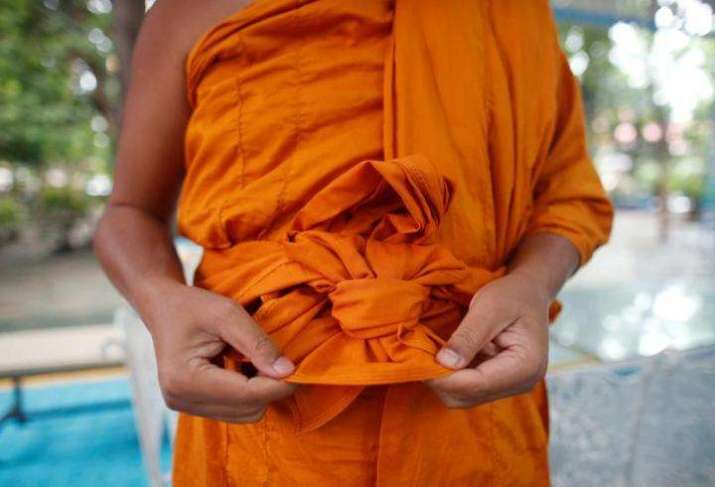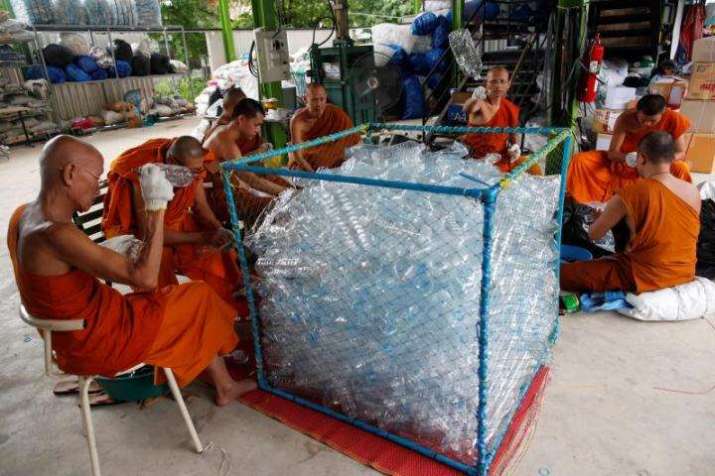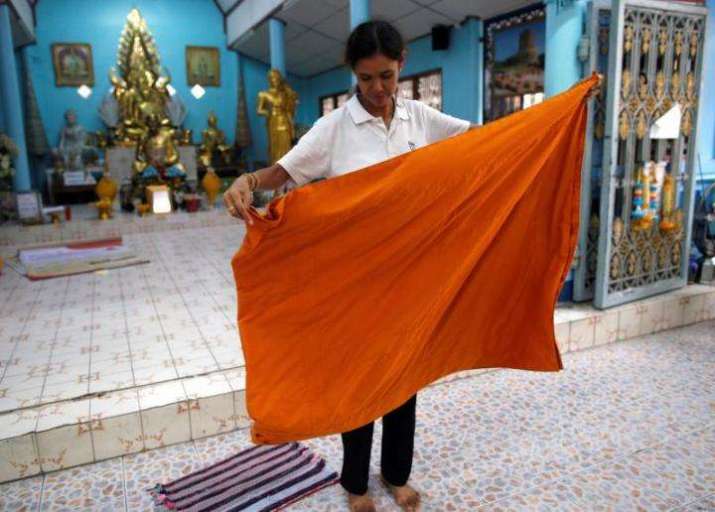
Disposable plastic bottles remain a major environmental threat to the planet, however the monks of Wat Chak Daeng, a Buddhist temple on the artificial island of Bang Kachao in Bangkok, Thailand, have been integrating their Dharma practice with environmental awareness by recycling plastic bottles to make monastic robes.
Venerable Thipakorn, one of the monks pushing this initiative as a way of being more responsible toward the environment, observed: “There is not a big difference between the robes . . . I myself wear a recycled plastic robe and they are very similar to the traditional ones.” (Gulf News)
The project is an example of the sustainable application of modern technology by converting plastic bottles into wearable fabrics. First of all, discarded plastic bottles are collected in the temple compound. After compressing them they are packed into bales and sent to a processing plant, where the plastic is chipped and melted into fabrics, which are returned to temple. Volunteers in the temple fashion the recycled fabrics into robes for the monks. “Until now, we have made some 200 robes,” said Ven. Thipakorn. (Gulf News)

A local community association, which receives financial support from large companies and patronage from Thailand’s Royal Palace, is overseeing the initiative. This year, they have made seven full sets of monastic robes.
According to media reports, it takes about 30 plastic polyethylene terephthalate (PET) one-and-a-half liter bottles to produce a set of robes, each of which is composed of 30–35 per cent recycled plastic, combined with cotton and other materials.
According to the Nikkei Asian Review, Thailand ranks behind China, Indonesia, the Philippines, Vietnam, and Sri Lanka as the sixth-largest contributor to ocean waste in the world, generating 1.03 million tons of plastic waste per year, with more than 3 per cent of that finding its way into the ocean. A government survey in 2017 found that each Thai person uses an average of eight plastic bags per day, equating to around 198 billion per year.
Plastic pollution is obviously not only a problem in Thailand, but a global issue affecting land and marine environments; it is well known that human reliance on plastics is causing immeasurable environmental damage.
The monks of Wat Chak Daeng are also using plastic waste to produce furniture, helping to create a more sustainable living environment. In addition to robes, the monks reuse bottle caps and labels to make chairs and other items, setting an example to the local community of the need to fight against plastic waste and excessive consumption.
Thailand is predominantly a Theravada Buddhist country, with 94.5 per cent of the kingdom’s population of 69 million identifying as Buddhists, according to census data for 2015. The next most prominent religion is Islam, representing 4.29 per cent.

See more
The Buddhist monks whose robes are made from plastic bottles (YouTube)
Buddhist monks whose robes are made from plastic bottles (Gulf News)
The Buddhist monks whose robes are made from plastic bottles (news4europe)
Thailand falling behind in global battle with plastic waste (Nikkei Asian Review)
Related news from Buddhistdoor Global
Innovative Cleanup Project to Tackle the Great Pacific Garbage Patch Relaunched
High Court Orders Bodh Gaya a Plastic-free Zone, Demands Government Action against Plastic Pollution
Dutch Supermarket Chain Launches Plastic-free Aisle












